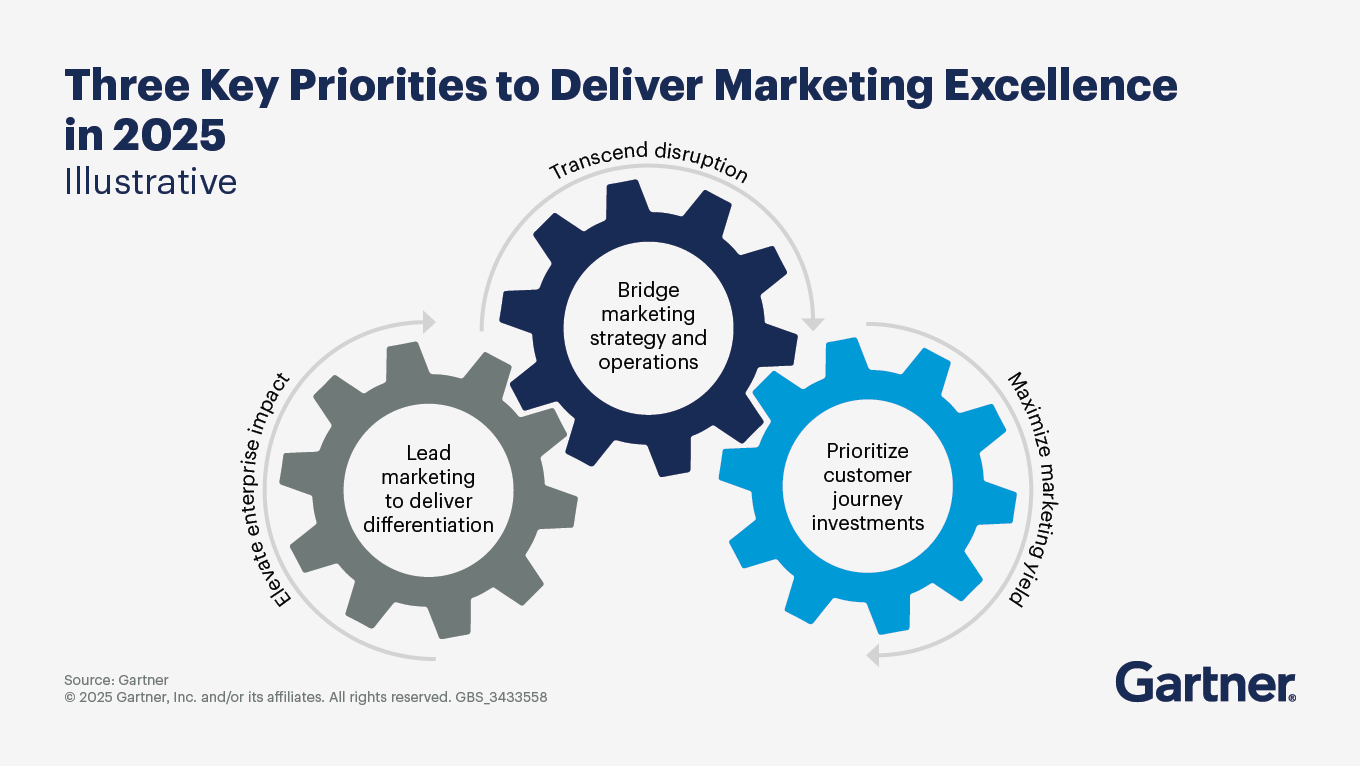Focus on bridging the gap between strategic plans and operational execution.
- Gartner client? Log in for personalized search results.
How CMOs can contribute to enterprise growth
Chief marketing officers (CMOs) are under increasing pressure to deliver transformative growth. Nearly 40% of today’s marketing budgets are devoted to change and transformation activities, and 69% of marketing teams report undergoing at least three different types of changes in the past year. Yet marketing budgets are at a postpandemic low, forcing marketing leaders to do more with less.
In the face of all this disruption, CMOs must strive to double down on what matters most: delivering on their strategic plans.
The top trends affecting CMOs in 2025
This year, successful CMOs will rise to meet heightened expectations by responding and prioritizing based on three trends:
CMO trend No. 1: Tactical thinking dominates marketing
Recent years have seen a shakeup in the marketing function. New technologies and channels have emerged, eroding the traditional barriers between customers and brands. The rapid pace of change is disillusioning and overwhelming even the most well-prepared marketing leaders and teams. Marketers who report high rates of change are twice as likely to experience burnout.
With 84% of business leaders aiming to significantly change their organization’s identity in the next five years, CMOs shouldn’t expect a reprieve anytime soon. What’s more, these constant disruptions are damaging CMOs’ ability to meet their long-term strategic goals.
Ongoing disruption and the pace of change have resulted in tactical thinking dominating marketing, as teams react to the next urgent issue in front of them. This diminishes marketing’s long-term strategic impact.
CMO trend No. 2: Credibility lags among business leaders
Just 14% of CEOs and CFOs view their CMO as highly effective at market shaping and identifying and fulfilling customer needs, according to a recent Gartner survey. Yet companies with CMOs who are considered market shapers are more than twice as likely to exceed revenue and profit goals.
For their part, only about half of CMOs say they receive proper credit for their contributions to the business. Many report being perceived as leading a cost rather than profit center.
Unfortunately, these internal pressures steal focus from the fundamental, business-critical challenge of market differentiation in a hypercompetitive environment.
CMO trend No. 3: AI won’t solve poor customer understanding
In a 2024 Gartner survey, 58% of consumers said that companies fail to understand their needs and priorities when pitching products. As a result, many marketing campaigns underperform, despite growing access to data-driven insights and new technologies.
Generative AI, in particular, has become a top priority for marketing teams, with its promise of improving efficiency and yield. However, many organizations struggle to deliver this value.
Often these technologies merely serve to expose gaps in understanding between the company and its customers, presenting a strategic challenge for CMOs.
How 2025 trends will influence CMO priorities
In 2025, CMOs will need to meet rising demands for transformative growth by bridging the strategy-operations gap, differentiating themselves in the market and prioritizing investments in the customer journey.
Learn more about these priorities — and the actions CMOs must take to realize them — in the 2025 Chief Marketing Officer Leadership Vision.
2025 Trends for CMOs FAQs
What is the Gartner 2025 Leadership Vision for CMOs?
The Gartner 2025 Leadership Vision for Chief Marketing Officers highlights three trends and recommended actions that CMOs must address in 2025 to increase the positive impact they and their teams have on their organization and its talent strategy. For 2025, these trends include the dominance of tactical thinking, lack of visionary leadership, and disillusionment with new technologies.
What should CMOs prioritize in 2025?
Moving into 2025, CMOs should prioritize:
Spanning the traditional divide between marketing strategy and operations
Embracing new leadership behaviors to deliver growth through differentiation
Investing in the customer journey with a focus on aligning current marketing strategies with customer needs and behaviors
Attend a Conference
Join Gartner experts and your peers to accelerate growth
Join CMOs and marketing executives to learn how to navigate emerging trends and challenges. From peer-led sessions to analyst one-on-ones, you'll leave ready to tackle your mission-critical priorities.
Gartner Marketing Symposium/Xpo™
Denver, CO

Drive stronger performance on your mission-critical priorities.
